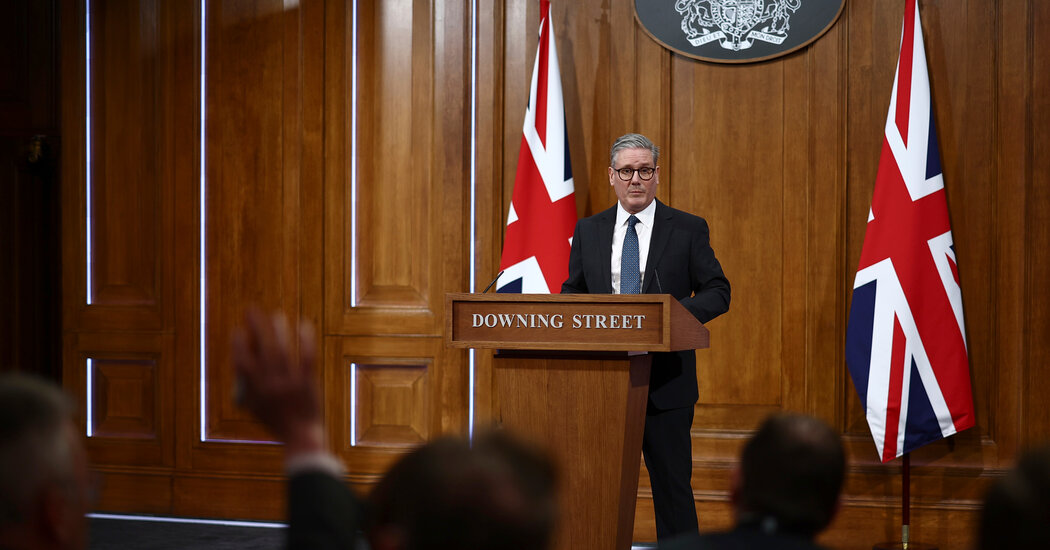Britain faces a new and dangerous form of extremism, Prime Minister Keir Starmer said on Tuesday, warning that loners and misfits were being radicalized by “a tidal wave of violence freely available online.”
In a speech at Downing Street, Mr. Starmer said that unlike the terrorist threat posed by organized groups like Al Qaeda, where a clear ideology could be identified, some young people were becoming fixated on extreme violence for its own sake. He compared the brutal murder of three girls at a dance class last July in Southport, England, to some of the school shootings seen in America.
On Monday, Axel Rudakubana, 18, admitted to murdering three girls in the coastal town of Southport and to attempting to kill 10 other people. The attack last summer prompted rioting in several towns and cities across England and in Northern Ireland.
Serena Kennedy, the chief constable of Merseyside Police, the force that covers Southport, said in a statement on Monday that Mr. Rudakubana had “an unhealthy obsession with extreme violence,” as evidenced by a trove of documents, images, videos and texts about violence, conflict and genocide that he had viewed on his digital devices.
“We know that he had researched numerous documents online which show that obsession,” she said, adding: “From all those documents, no one ideology was uncovered, and that is why this was not treated as terrorism.”
On Monday the government announced a public inquiry after it emerged that the perpetrator had been referred three times to a counterterrorism program called Prevent, when he was 13 and 14, because of his interest in extreme violence. Because he was deemed not to be motivated by a terrorist ideology, he was not considered suitable for intervention.
Mr. Starmer said that this judgment was “clearly wrong,” and that he would not let any institution of the state “deflect from their failure,” which, “in this case, frankly, leaps off the page.”
He rejected claims from Britain’s right-wing media that there had been a coverup around the murders, saying that he had been briefed on the police investigation as it was underway but had been prevented by law from disclosing information about the perpetrator in advance of any possible trial. Strict rules govern the release of information during active court proceedings in Britain in order to guarantee the right to a fair trial.
“If this trial had collapsed because I or anyone else had revealed crucial details while the police were investigating while the case was being built, while we were awaiting a verdict, then the vile individual who committed these crimes would have walked away a free man,” Mr. Starmer said.
In the days after the attack on July 29, right-wing critics suggested that information was being suppressed about the perpetrator to contain public anger. Rioting exploded after the rapid spread of misinformation about the killer’s identity — including false claims that he was a recently arrived undocumented immigrant from Syria. Mr. Rudakubana was born in Wales.
The police announced in October that after searching Mr. Rudakubana’s house, they had found ricin, a lethal toxin, and a PDF file titled “Military Studies in the Jihad Against the Tyrants: The Al Qaeda Training Manual.” But in statements on Monday, investigators made clear that the killer’s interest in violence was wide-ranging and did not appear to stem from any single ideology.
The Southport attack was “a sign,” Mr. Starmer said, that terrorism was evolving and that Britain faced a new threat alongside more organized groups such as those linked to or inspired by Al Qaeda.
“We also see acts of extreme violence perpetrated by loners, misfits, young men in their bedroom, accessing all manner of material online, desperate for notoriety,” said Mr. Starmer, adding that, while such people were sometimes inspired by traditional terrorist groups, they were “fixated on that extreme violence, seemingly for its own sake.”
Since such acts were designed to terrorize, Mr. Starmer said, Britain’s antiterror laws might need to change in order to recognize and tackle the new threat.
“I do think it’s new — you’ve seen versions of it in America with some of the mass shootings in schools,” he said. “It is not an isolated, ghastly example. It is in my view an example of a different kind of threat.”
Speaking in Parliament, Yvette Cooper, the home secretary, said that Mr. Rudakubana had admitted to carrying a knife 10 times and that, despite having a record for violence and being just 17 years old, he was easily able to order a knife on Amazon.
“That is a total disgrace and it must change,” she said, adding that the government “will bring in stronger measures to tackle knife sales online.”
Ms. Cooper also told lawmakers that the government would contact technology companies to ask them to remove dangerous material that Mr. Rudakubana had viewed, adding that firms “should not be profiting from hosting content that puts children’s lives at risk.”
Earlier, Mr. Starmer argued that the tragedy of the Southport killings “must be a line in the sand for Britain.” It would, he said, address questions that were “far-reaching, unburdened by cultural or institutional sensitivities and driven only by the pursuit of justice.”
Chris Philp, who speaks for the opposition Conservative Party on home affairs, welcomed the establishment of a public inquiry but said that it should investigate “what the government knew when,” whether the authorities were “as open and transparent with the public as they could have been,” and whether any lack of transparency contributed to the riots.


